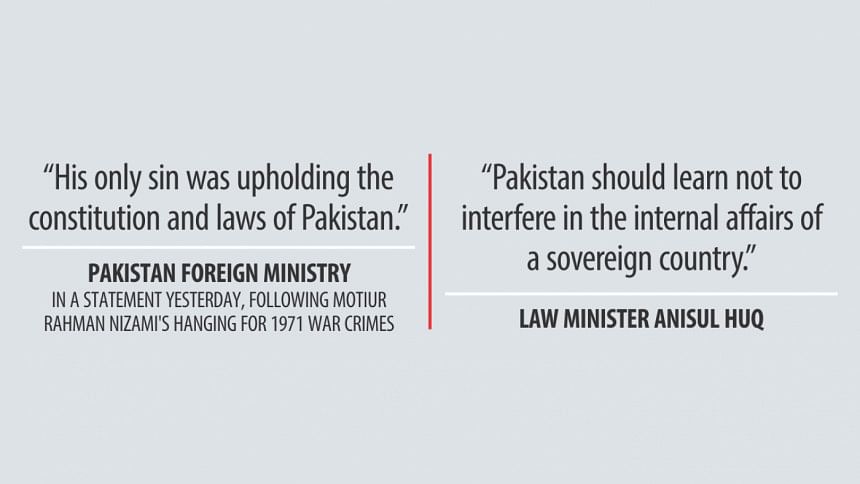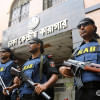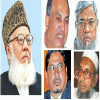Pakistan again sides with war criminals

Pakistan national parliament has once again sided with war criminals by passing a resolution to express serious concerns over the execution of Jamaat-e-Islami chief Motiur Rahman Nizami.
This has caused a huge outcry in Bangladesh and risks further straining of the relations between the two countries. Ministers and war crimes trial campaigners have termed the resolution a brazen attempt to meddle in internal affairs of the country.
In the resolution passed unanimously, Pakistan parliament also condemned the war crimes trial proceedings in Bangladesh and described them as against the law, justice and human rights.
In December 2013, it passed a resolution after the execution of convicted war criminal Abdul Quader Mollah, another leader of Jamaat, the party that worked fiercely against the birth of Bangladesh.
Earlier yesterday, Pakistan foreign ministry issued a statement that reads: “Pakistan is deeply saddened over the hanging of the Ameer of Jamat-e-Islami Bangladesh, Mr. Moti-ur-Rehman Nizami...”
The resolution and the statement came two days after Dhaka reacted sharply to Pakistan's May 6 statement on the dismissal of Nizami's review petition. It had summoned the Pakistan High Commissioner Shuja Alam to register its strong disapproval.
Nizami, the chief of Al-Badr, an auxiliary force of Pakistan army in 1971, was executed early yesterday, for committing crimes including the killing of intellectuals and mass murders in Pabna during the nine-month war.
Law, Justice and Parliamentary Affairs Minister Anisul Huq yesterday said Pakistan should realise that Bangladesh has been an independent country for the last 45 years and that it is not a part of Pakistan.
He observed, “Pakistan should learn not to interfere in the internal affairs of a sovereign country. Pakistan should thank Bangladesh for the magnanimity it showed by allowing occupation soldiers to return home after their surrender in Dhaka, even though they had committed genocide and other heinous crimes in 1971.
“I hope good sense will prevail and they [Pakistan] will keep their mouth shut …
“Lastly, I want to say that Pakistan is the last country that should talk about human rights. We do not need a lesson on human rights from Pakistan.”
Liberation War Affairs Minister AKM Mozammel Huq said, "I want to ask Pakistan to stop interfering in our internal matters. Otherwise, it will affect our diplomatic relations, and the government will be compelled to cut ties with it, as demanded by the people."
Talking to The Daily Star, he added, "We always said the war criminals don't believe in Bangladesh's existence and they are the citizens of Pakistan. Pakistan's reactions after each of the verdicts proved our claim."
Referring to Pakistan foreign ministry's statement, State Minister for Foreign Affairs Shariar Alam said Pakistan continues to make comments supporting these convicted war criminals.
“Their statement is an utter lie and absolutely unacceptable,” he said, adding, “They can't be our friend or partner … those who stand against our independence and the history of our independence.”
About Pakistan's claim on the 1974 agreement, he said the essential spirit of the agreement was to create an environment for good neighbourliness and peaceful co-existence.
The agreement never implied that the masterminds and perpetrators of war crimes, crimes against humanity and genocide would continue to enjoy impunity and eschew the course of justice.
He said the verdicts in Nizami's case had been delivered through an independent, sound, fair, impartial, open and transparent judicial process, and without any political interference.
The trial only considered the crimes committed by Nizami in 1971 and it had nothing to do with his political identity or affiliation.
ASM Feroz, chief whip of parliament, said that by passing such a resolution, Pakistan attempted to interfere in the internal affairs of Bangladesh. “We strongly denounce it.”
Prominent war crimes trial campaigner Shahriar Kabir said Bangladesh “must adopt an aggressive diplomacy against Pakistan”.
In response to Pakistan's reactions, Bangladesh should immediately start the trial of the Pakistani high command in 1971 and its army officials for committing crimes during the Liberation War, said Shahriar, the acting president of Ekattorer Ghatak Dalal Nirmul Committee, an organisation campaigning for the war crimes trial since the early '90s.
Referring to the tripartite agreement, he said Pakistan itself violated the agreement, as it did not take back the stranded Pakistanis living in Bangladesh.
Besides, the agreement had no validity as neither Bangladesh nor Pakistan parliament endorsed it, he said. As per the Vienna Convention, to which Bangladesh is a signatory, there are some crimes that cannot be forgiven by any government, and genocide is one of them, he added.
THE RESOLUTION
Before the resolution was passed, the Pakistan parliament offered fateha for Motiur Rahman Nizami, reports Radio Pakistan website.
On points of order, several MPs condemned Nizami's execution.
They said the execution was a “violation of the agreement signed among Bangladesh, India and Pakistan in 1974”. They were of the view that the execution was a “judicial murder and violation of human rights”.
Lawmaker Mahmood Khan Achakzai proposed that a parliamentary committee be formed, which will visit Bangladesh in coordination with the Pakistan foreign office to talk on the issue.
Minister for Railways Khawaja Saad Rafique said the “execution of political opponents” in Bangladesh was a serious issue, causing unrest among the Pakistanis.
He said those who were executed did not violate the law and constitution of the United Pakistan. He called for immediate steps with the cooperation of other Islamic countries to stop these executions in Bangladesh.
Condemning the executions, parliament members emphasised that the matter should be raised before the UN. They also called for convening an OIC meeting to discuss the issue, reports Radio Pakistan.
THE STATEMENT
“Pakistan is deeply saddened over the hanging of the Ameer of Jamat-e-Islami Bangladesh, Mr. Moti-ur-Rehman Nizami, for the alleged crimes committed before December 1971. His only sin was upholding the constitution and laws of Pakistan,” reads the Pakistan foreign ministry statement published on its website.
“The act of suppressing the opposition by killing their leaders through flawed trials is completely against the spirit of democracy. The execution is also unfortunate for the people of Bangladesh who had elected Mr. Nizami as their representative in the Parliament,” it said.
“Ever since the beginning of the trials, several international organisations, human rights groups and international legal figures have raised objections to the court proceedings, especially regarding fairness and transparency, as well as reported harassment of lawyers and witnesses representing the accused. The international community has objected to the steps taken by Government of Bangladesh to impose restrictions on the independence of judiciary,” it added.
“As part of the 1974 Tripartite Agreement, the Government of Bangladesh decided not to proceed with the trials as an act of clemency. The Government of Bangladesh therefore should uphold its commitments as per the Agreement,” it said.
“Pakistan offers condolences to the bereaved family members and the followers of Nizami,” it added.

 For all latest news, follow The Daily Star's Google News channel.
For all latest news, follow The Daily Star's Google News channel. 








Comments